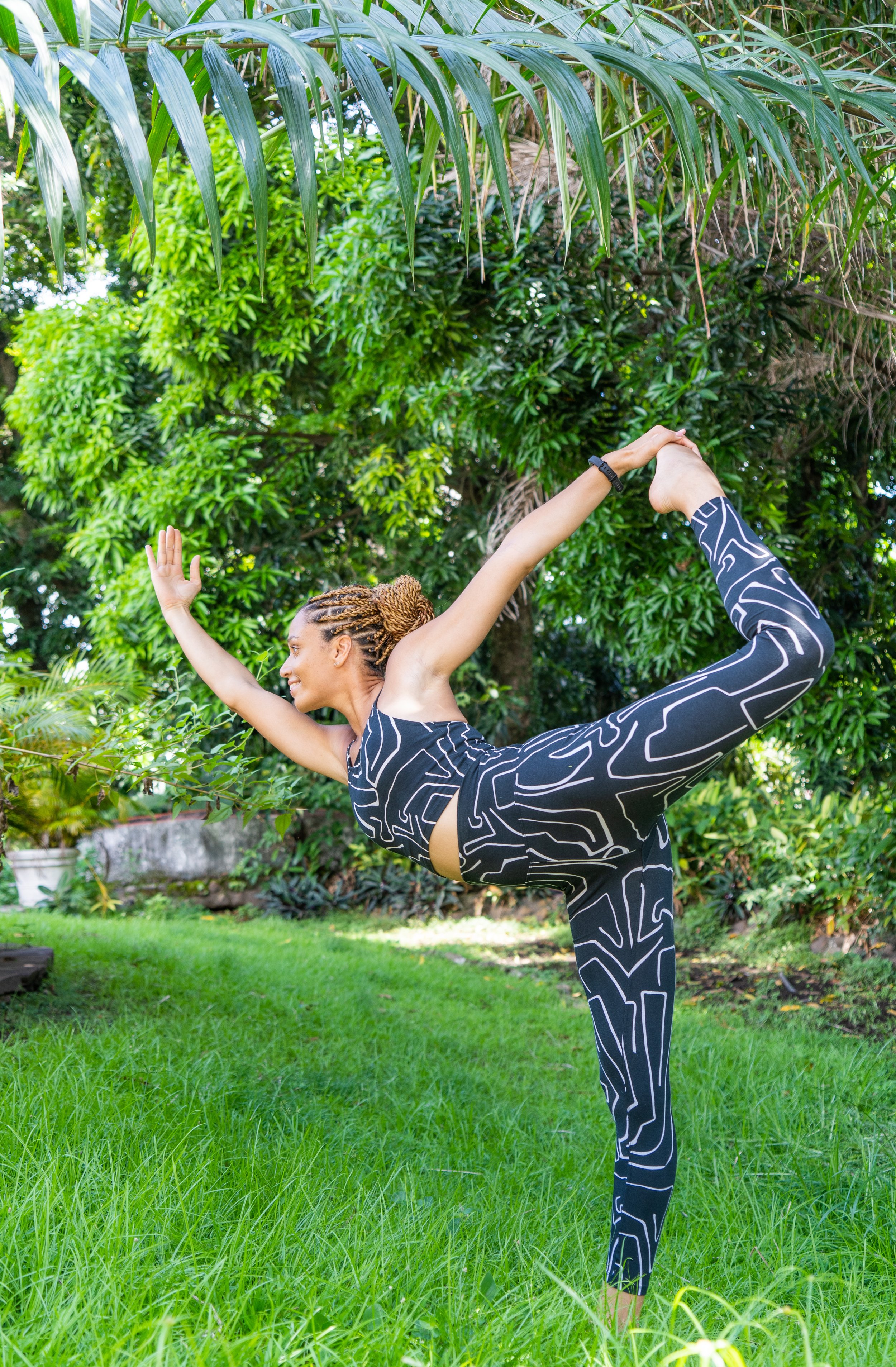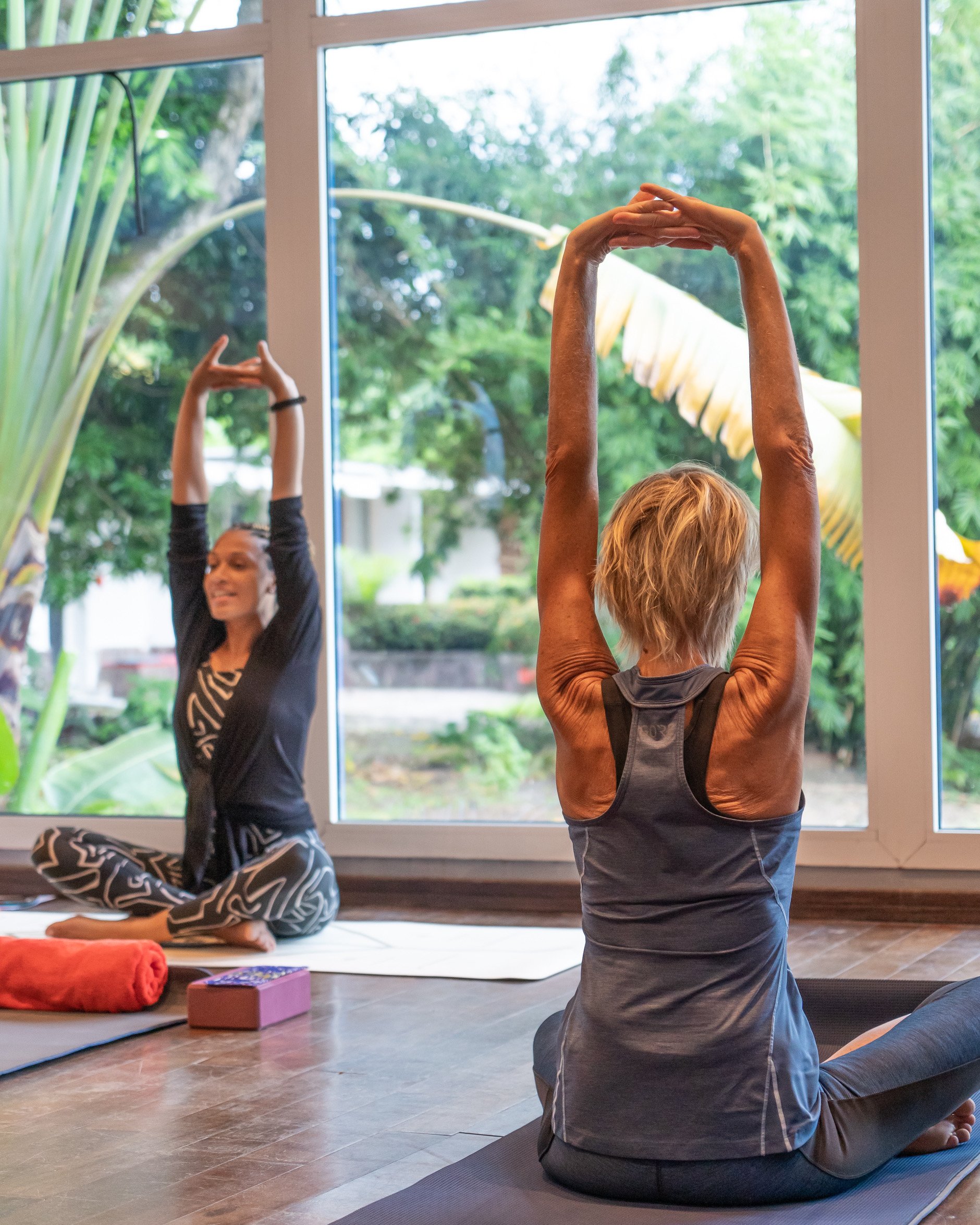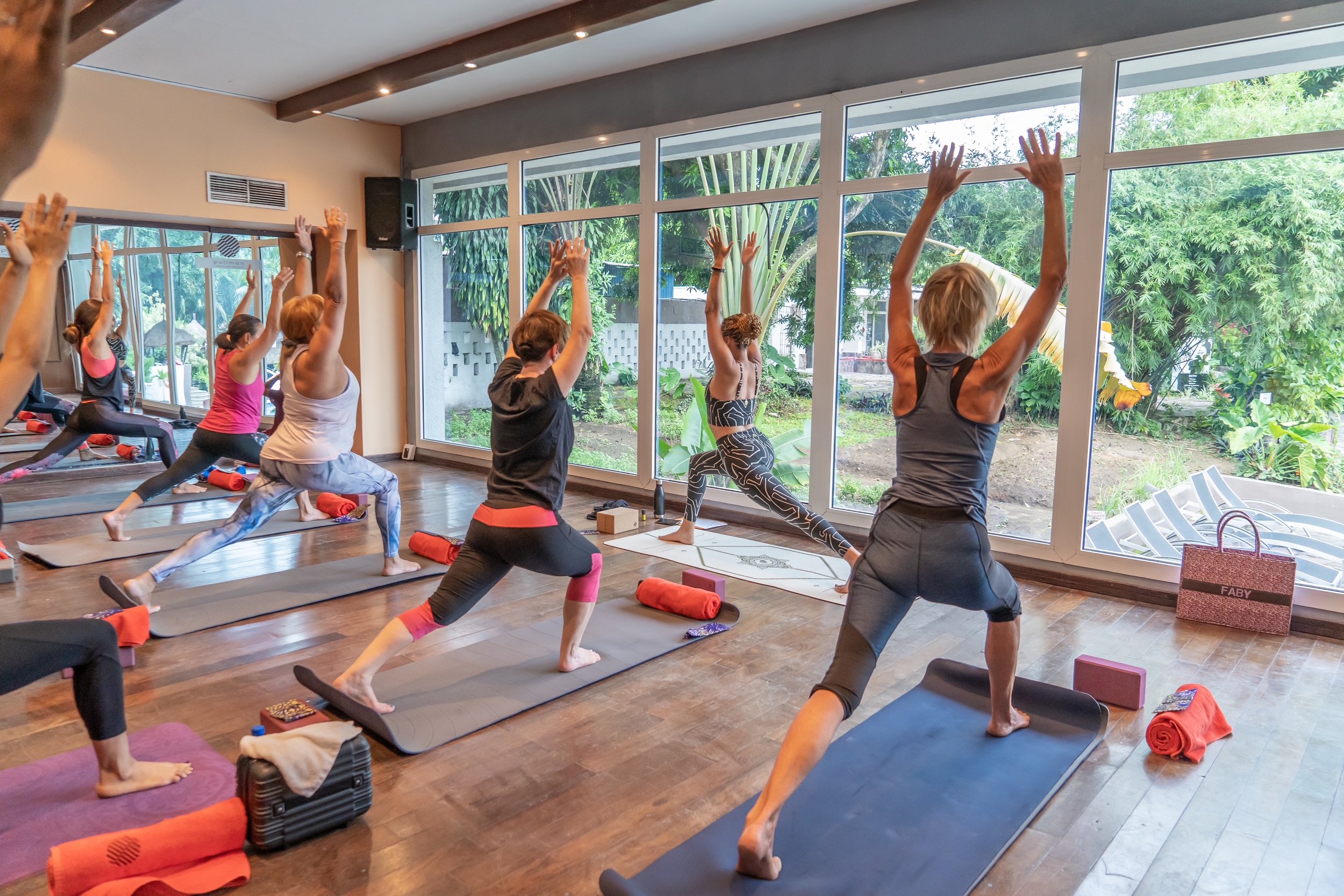“Adding a yoga session to your running training is a great way to protect yourself against injury.”
Fabienne Kabeya, founder of Kinshasa’s first yoga studio MonamaYoga shares with us, why yoga and meditation are essential for long distance running and preparing for a marathon.
Can you introduce yourself to our readers?
I am Fabienne Kabeya, yoga teacher (and lifelong yoga student ), founder of Kinshasa’s first yoga studio, MonamaYogaStudio.
How did you discover yoga and what made you decide to become a yoga teacher?
I was practicing a lot of different sports and wanted to try something new. My aunt who was already initiated to yoga brought me to my very first Hot Yoga class. This is how I discovered the world of yoga. After several years of a purely postural and rigorous practice (Hot Yoga, Vinyasa, etc.) I became aware of all that yoga has to offer and began to deepen my knowledge. Yoga became my passion and helped me a lot during life challenges, I had to overcome. During Covid time I started to practice yoga with some friends and received a lot of positive feedback on my teaching skills. It felt great to see others feeling the benefits of yoga and progressively the need to share yoga with others came and I decided to become a teacher.
How does incorporating yoga practices such as stretching, relaxation, and meditation benefit runners in their training for a marathon?
Yoga helps restore balance and symmetry to the body. Adding a yoga session to your running training is a great way to protect yourself against injury. In addition to its physical potential, yoga makes you more aware of your body and how it works. The yoga breathing techniques will help you to improve your lung capacity and manage more effectively your efforts. Meditation will allow you to enhance your sense of wellbeing and drive the development of your mental resilience. You will release all stress and calm your mind.
Can you explain the role of stretching in improving flexibility and preventing injuries for runners, particularly during the rigorous training phase leading up to a marathon?
Yoga focuses on the postural muscles, in depth, and helps develop even strength throughout the body. The yoga postures, held for several breaths, reinforces the muscles, and allow a deep stretch. The result is improved muscle fiber quality and greater range of motion and so a lighter stride. Gentle yoga such as Yin Yoga will allow a very deep stretch and help loosen up the muscles. It enables you to work on several muscle groups as well as your connective tissues (ligaments, tendons, fascia, etc.). Yin Yoga will also enable you to work your muscle insertions, which are very much in demand when running, and you'll be able to avoid any muscle tears or contractures.
How do relaxation techniques practiced in yoga help runners manage stress and anxiety associated with marathon training and race preparation?
Relaxation enables you to prepare yourself mentally. Through mindfulness and autosuggestion, you can face your emotions, accept them and progressively letting go.
What are some specific yoga poses or sequences that you recommend for runners to incorporate into their training regimen to enhance flexibility, balance, and overall performance?
Surya Namaskar: Sun salutation, is a sequence of poses done one after the other in a “flow” and a great way to warm-up and prepare the body thoroughly. It engages your entire body and provides everything you need for a dynamic stretching session.
Anjaneyasana: Low lunge. This posture provides a deep stretch for the hip flexors, adductors, glutes, and quadriceps.
Virabhadrasana III : Warrior pose III, an excellent stretch for the hips and hamstrings, that also improves mobility in the ankles.
Malasana: Garland pose. Done in a dynamic flow the squatting will be useful for strength training. Holding the pose is a useful position for recovery. It will help releasing the tensions in your hips, groin and lower back, while improving ankle flexibility.
How does meditation contribute to mental focus, clarity, and resilience for runners, especially during long training runs and on race day?
Meditation will help you to improve your concentration and stay focus on your objectives. Mental fluctuations will occur during your training but also during the marathon. Negative thoughts may arise during the last kilometers. Being mindful will help you to keep your focus on something else than the heavy legs or pain you will feel and to achieve your goal.
Can you discuss the importance of breath awareness and control in yoga, and how it can help runners maintain optimal breathing patterns and endurance during distance running?
Breathing is one of the pillars of yoga. Each movement during yoga practice is synchronized with the breath. Properly controlled, it ensures good blood circulation, which is beneficial to all aspects, whether physical or mental. Through proper yogic breathing, you will approach the marathon in a much more serene way, you will calm your heart rate and use fully your lung capacity.
Are there any mindfulness practices or meditation techniques that runners can use to stay present and focused during their training sessions and the marathon itself?
By focusing on your breath, the sounds around you, or the way your feet feel touching the ground as you run. These are great techniques to help you stay in the present moment and focused. Another technique called Japa mantra meditation can be useful for people who are more connected to their brain. Repeating mentally a mantra or positive affirmation will allow you to keep your focus on something else than your body. Visualization is also a very interesting technique. Visualizing a successful race or the arrival, can help you go through difficult training sessions.
How does yoga help runners improve their body awareness, which are crucial for maintaining proper form and preventing injuries during long-distance running?
Staying in the present moment and conducting each movement will full awareness and respect for your limitations is crucial in yoga and helps preventing injuries.
Could you share some relaxation strategies that runners can use to aid in post-run recovery and promote restful sleep, especially during intense training periods?
I would recommend Yoga Nidra. Yoga Nidra is a simple but effective meditation practice that requires no previous experience because an instructor guides it. Nidra is the Sanskrit word for sleep, and that is where this form of meditation differs from others, as it is practiced while laying down. Yoga Nidra practice helps lower stress levels and improve sleep quality. This enhanced quality of restorative sleep and recovery impacts an athlete’s performance and a general sense of wellbeing, making their proactive recovery a key asset.
In the hectic city like Kinshasa, what are your favorite places to unwind and relax?
Sundays on the river are for me the best way to relax. Just enjoying the sun and feeling the water of the river flowing through your toes is very rejuvenating.
What is your personal yoga and meditation routine?
I try to meditate every morning for at least 10 minutes. Depending on my mood and energy I practice a dynamic yoga flow or a gentle flow or yoga stretching. I love to practice different styles. I also practice yoga nidra which helps me a lot, but I have to admit it’s been a while since my last session.
How can people find you? Where in Kinshasa do you teach yoga?
People are most welcome to practice with us at MonamaYogaStudio located in Gombe, at the Golf-Kinshasa, 414 Ave du Cercle. I do teach dynamic and gentle flows, Traditional Hatha and Yin Yoga. All our classes are accessible to all and don’t require previous yoga experience. My colleague Beni will also welcome you for some fascia yoga and deep tissue stretching.



